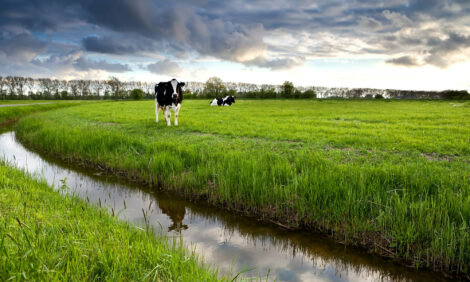



Cattlemen Converge on Capitol Hill
US - About 250 cattlemen from across the United States are in the nation's capital this week for the National Cattlemen's Beef Association (NCBA) Spring Legislative Conference.| Agriculture Secretary Ed Schafer: "A new Farm Bill would allow us to do more in the areas of conservation and nutrition." |
The week's activities kicked off on Monday with a meeting of the Public Lands Council, made up of ranchers who graze livestock on public lands. On Tuesday, cattlemen were presented with a "state-of-the-industry" report and forecast featuring market analysis from Cattle-Fax, as well as research on current economic issues and consumer trends affecting the beef industry.
On Wednesday, cattlemen were addressed by Douglas Ross, special counsel for agriculture in the Antitrust Division of the Department of Justice. Ross explained the issues and factors that will shape the department's examination of the proposed acquisitions of Smithfield Beef and National Beef by JBS Swift. The planned acquisitions raise significant concerns for cattle producers, because they would essentially combine the nation's third, fourth and fifth largest beef processors into a single entity.
Ross acknowledged this would bring further consolidation to the already-concentrated beef processing sector. He emphasized, however, that a high level of concentration alone does not necessarily constitute a violation of the nation's antitrust laws. He said each case must be determined on its own facts, and that specific evidence is required to prove the acquisitions will result in a reduced level of competition in the marketplace. But he welcomed input from cattle producers on the issue, and encouraged all cattlemen in attendance to voice their concerns to the Justice Department.
"We listen carefully to the concerns of agricultural producers and producer groups as to how a proposed merger or course of conduct might affect you," Ross said. "And we're equally concerned if the effect is an anti-competitively low price for products sold by farmers, as we are if it is an anti-competitively high price for products purchased by farmers."
Later in the day, cattlemen met with several officials from the U.S. Department of Agriculture, including an address by Agriculture Secretary Ed Schafer. Schafer said he is hopeful that Congress can come together on a new Farm Bill before the latest extension of the current law expires on April 18. He said President Bush is unlikely to approve any further temporary extensions, so if a consensus is not reached by April 18, a one-year extension of the current law is the most likely outcome. But Schafer emphasized this is not really a desirable solution.
"The 2002 Farm Bill was good policy at the time. It was written, however for a different market, in a different place," Schafer said. "A new Farm Bill would allow us to do more in the areas of conservation and nutrition, in the areas of renewable energy and support for specialty crops, than the current law would ever allow."
Schafer expressed optimism for enhancing beef exports, noting that Russia has become a prime target for U.S. beef and that he has high hopes for re-entry into South Korea in the near future. Pending free trade agreements with Colombia and Panama would also enhance export opportunities, he said.
* "If we can open up a little bit more grazing land and some more hay production, perhaps that will help cattlemen get through this tough time." |
|
Eric Smith vice chairman of the NCBA Policy Division
|
"If we can open up a little bit more grazing land and some more hay production, perhaps that will help cattlemen get through this tough time," Smith said. "We don't want to reduce our herds any more than we already have."
Utah cattleman Tim Munns requested a later grazing season in western states, when cattle producers in the region have the greatest need for additional grazing.
"One blanket doesn't fit the whole country," Munns said. "In our country, we need that grazing later in the fall."
John Johnson, deputy administrator for farm programs at USDA, was receptive to proposals that would help livestock producers better utilize CRP acres. But he noted that legal action filed against USDA under the National Environmental Policy Act (NEPA) has made the issue more complicated.
"We had to enter into a settlement agreement with the National Wildlife Federation that took us back to some more conservative nesting season dates for grass-nesting birds - as well as a dramatically reduced frequency for managed haying and grazing - until such time as we can complete this more extensive NEPA work," Johnson said.
In addition to their discussions with officials at several agencies within USDA, cattlemen also held meetings Wednesday at the Office of U.S. Trade Representative, U.S. Forest Service, Department of Homeland Security, Bureau of Land Management, Food and Drug Administration, U.S. Fish and Wildlife Service, and Environmental Protection Agency.
The NCBA Spring Legislative Conference concludes today, Thursday, when cattlemen break into state delegations to meet with their Congressional representatives on Capitol Hill.
"A lot of teamwork goes into these conferences," said Montana rancher Bill Donald, chairman of the NCBA Policy Division. "There's nothing like a bunch of cowboy hats walking around Washington, D.C., to get people's attention and to let them know there are real people being impacted by the policies and regulations they are implementing."
TheCattleSite News Desk


